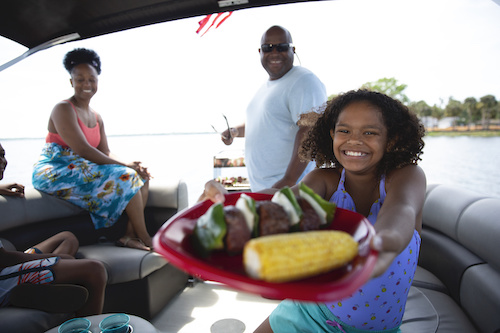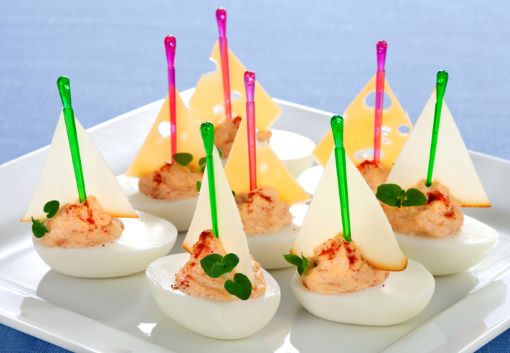Cooking aboard a boat is different than cooking at home. First, everything is smaller including the stove, refrigerator (if any), sink, cabinets for provisions, and even the trashcan. Second, water, propane and electricity may be limited because a boat away from the dock is a self-sustaining platform and running out of cooking fuel in the middle of a meal could mean no meal.
Here are some of the best tips for cooking and eating well on a boat.
How to Cook on a Boat
- Plan your meals ahead of time for the duration you'll be onboard.
- Make meals in advance onshore that you can freeze and reheat later.
- Focus on space management—storage is limited within a boat's galley.
- Ensure your galley is fully stocked with the proper kitchen tools and equipment.
- Adjust your expectations and be realistic when meal planning.
10 Steps for Planning a Successful Boat Camping Trip
Plan Ahead
Whether you’re heading out for an afternoon cocktail party or a two-week offshore voyage, it’s important to think through and write down your meal plan ahead of time. A boat away from the dock means you can’t just run to the store to pick up forgotten items. Also, you’ll need to check how much space you have to stow the provisions, especially if they need to be refrigerated.
- Written menus will help you incorporate leftovers from one meal into parts of another, thereby saving time, space and ingredients.
- If multiple people will be cooking, it’s best to have a point person who puts together a list of what to purchase or there will be too much to bring aboard, stow and left over.
- On a long trip, use up food that will spoil quickly (like lettuce and tomatoes) leaving longer lasting items (like cabbage and potatoes) to be used later.
Meal Prep Ahead
One way to eat better on a boat is to make some more complex items at home and freeze them to use later. Stews, pasta dishes and even desserts can be made at the house. This rescues the cook from extended time in the galley, saves water on doing dishes and limits the number necessary of separate ingredients like spices.
Frozen meals help immensely on a passage when it’s too rough to cook but the crew still needs a hot meal. Even chopping vegetables and cutting cheese for happy hour can be done ahead so nobody misses any fun on deck.
Space Management
Sous chef duties can be challenging on a boat. Not only are galleys small with limited counter space, but a moving boat and a sharp knife can be a frightening combination.
- Try moving the cutting board to the dining table inside or in the cockpit and have the prep cook safely seated and out of the way of the chef.
- Do the dishes as you cook because boat sinks don’t hold much.
- Cook in steps because multiple large pots and small boat stoves aren’t compatible. You can quickly reheat before serving.
- Get all your ingredients out of the refrigerator together or in batches. The more you open the fridge, the more house battery power it will take to make it cold again.
- When packing the refrigerator, put items you’ll use first on top and combine items like lunch meats or yogurt containers in a bag so individual items don’t disappear to the bottom of a top-loading icebox.
Boat Storage Ideas: 10 Tips for Staying Organized Onboard
Proper Tools & Galley Equipment
Don’t skimp on proper tools but don’t expect to have all the equipment of home like a blender, mixer or a microwave. Invest in a couple of good knives and a cutting board that isn’t wood because boats are notorious for growing mold and bacteria. Collapsible silicone tools like bulky colanders work well in tight boat cabinets as do nesting bowls and pots with detachable handles. Check to see that baking dishes fit in the oven. Sealable plastic bags hold prepared foods, small batches of spices and leftovers. They don’t need to be washed and won’t make much trash. Have a headlamp for grilling in the dark.
Adjust Expectations & Enjoy
Excellent meals can be prepared aboard but adjust your expectations of how difficult it may be to do so. Boat ovens are small and cooking fuel like propane is limited so baking a turkey aboard for hours will be hard. Propane ovens are also damp and nearly never hold a decent temperature so turning out crisp bread or temperamental items like soufflés or custards will be challenging.
For cooks who tend to get seasick, spending hours in a swaying galley won’t be fun so consider splitting the duties with others. On the positive side, food tends to taste better at sea so even simple meals will be appreciated and dining outside under the stars means you’ll create a perfect setting with little work other than setting out a couple of electric candles.

